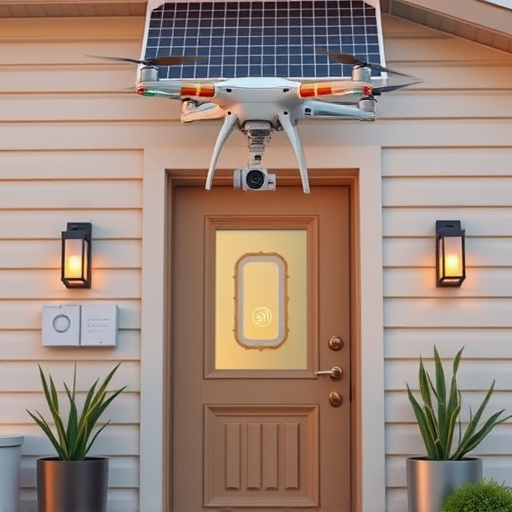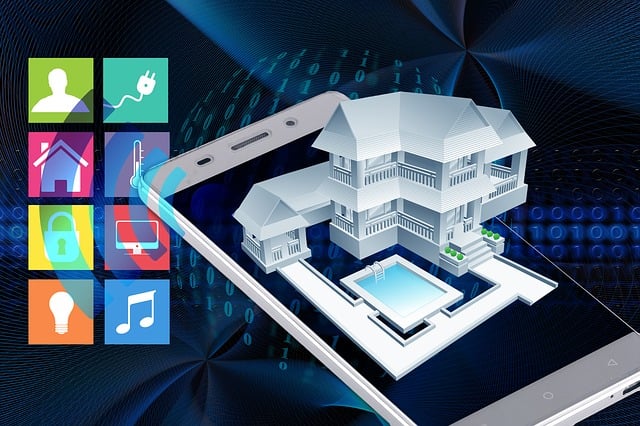The future of home security involves a seamless integration of smart home systems and advanced technologies like AI, ML, biometric authentication, and IoT devices. These innovations promise unparalleled control, enhanced privacy, and personalized protection. By learning from data and adapting to individual routines, these emerging security solutions not only predict but proactively address threats, revolutionizing the way we live and fostering a safer, more interconnected environment.
The future of home security is here, as innovative security technologies continue to transform our living spaces. From smart home integration to AI and biometric authentication, emerging home protection methods are redefining safety. As the Internet of Things (IoT) expands, so does the network of connected devices safeguarding our homes. Discover the latest trends and cutting-edge security solutions shaping tomorrow’s safe havens today.
- Smart Home Integration: The Future of Security
- AI and Machine Learning for Enhanced Protection
- Biometric Authentication: A Step Towards Personalized Safety
- Internet of Things (IoT) Devices: Expanding Home Security Networks
Smart Home Integration: The Future of Security

The integration of smart home systems and security devices is set to redefine how we protect our spaces. As future home security innovations continue to evolve, expect a seamless blend of technology within your living environment. Smart homes equipped with advanced security systems will offer unparalleled control and peace of mind. These innovative security technologies will enable homeowners to monitor their properties remotely, receive instant alerts, and automate various safety measures. From voice-controlled cameras to AI-powered intrusion detection, the emerging home protection strategies are both sophisticated and user-friendly.
Security technology advancements will prioritize privacy and efficiency. Cutting-edge security solutions might include facial recognition systems that differentiate between familiar and unfamiliar faces, ensuring only authorized individuals gain access. Additionally, predictive analytics could anticipate potential threats, allowing for proactive measures. As we move forward, future security trends will likely focus on personalized protection, where security systems adapt to individual routines and preferences, creating a more responsive and intelligent home environment.
AI and Machine Learning for Enhanced Protection

The integration of Artificial Intelligence (AI) and Machine Learning (ML) is set to revolutionize future home security, offering unprecedented levels of protection for homeowners. These cutting-edge security technologies enable smart homes to learn from patterns and behaviors, predicting potential threats with remarkable accuracy. By analyzing data from various sensors, cameras, and other connected devices, AI algorithms can identify unusual activities, detect familiar faces, and even recognize the sound patterns of known residents, differentiating them from intruders. This level of customization enhances overall security, ensuring that homes are protected not just by reacting to perceived dangers but by anticipating them.
Emerging home protection technologies powered by AI and ML also extend beyond individual properties, contributing to a more comprehensive security ecosystem. By sharing data across connected neighborhoods or communities, these innovative security technologies can help identify broader patterns and trends, enabling proactive measures against potential threats. This collaborative approach not only bolsters individual homes but also fosters a sense of collective safety, marking a significant shift in future security trends towards a smarter, more interconnected, and ultimately safer living environment.
Biometric Authentication: A Step Towards Personalized Safety

Biometric authentication is set to revolutionize future home security, offering a step towards personalized and enhanced safety. This emerging technology goes beyond traditional passwords or access codes, utilizing unique physical characteristics like fingerprints, facial recognition, or iris scans to verify identity. By integrating biometric systems into homes, residents can expect more tailored protection, ensuring that only authorized individuals gain entry.
With cutting-edge security solutions on the horizon, homeowners can look forward to a future where their residences become intelligent fortresses. Innovative security technologies are expected to learn and adapt to individual routines, automatically locking doors when an unfamiliar face approaches or detecting unusual behavior within the premises. These advancements in home protection promise not just to deter intruders but also to provide peace of mind for folks living in today’s digital era.
Internet of Things (IoT) Devices: Expanding Home Security Networks

As we move into an era dominated by digital transformation, the integration of Internet of Things (IoT) devices is set to revolutionize future home security. These smart devices, connected to a central network, offer unprecedented levels of protection and convenience. From motion sensors that trigger alerts in real-time to camera systems capable of facial recognition, IoT technology is transforming homes into highly responsive, interconnected fortresses.
Emerging home protection technologies powered by IoT promise to make security more proactive and adaptable. For instance, smart locks can automatically disengage when recognized occupants arrive, while integrated security systems can communicate with nearby emergency services upon detecting unusual activities. These cutting-edge security solutions not only deter potential intruders but also provide homeowners with peace of mind, marking a significant shift in the way we perceive and manage home safety in the future.






